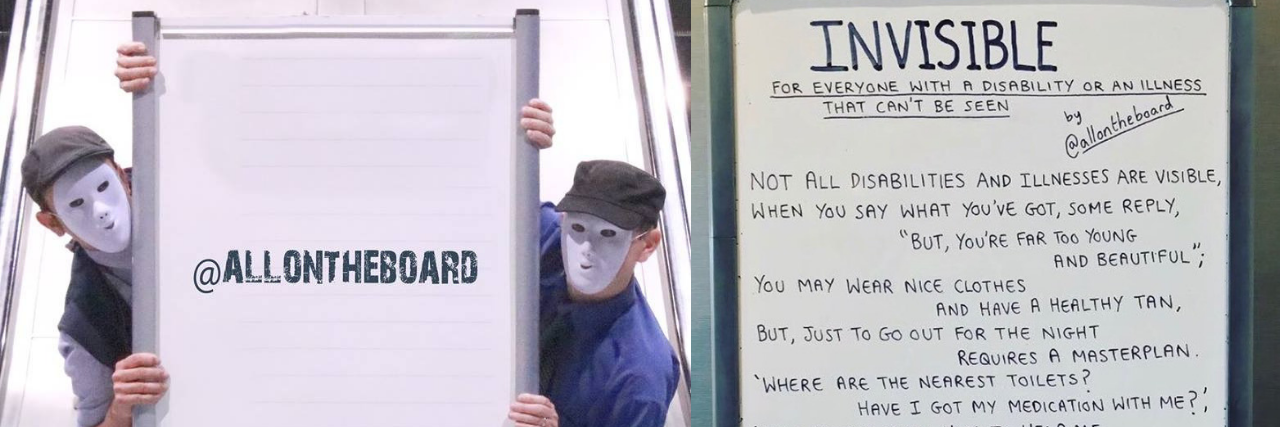Where was the last place you found health information? Maybe you learned about a condition online, read through pamphlets in a doctor’s office or saw a graphic on social media.
What about a service board in the London Underground, the city’s public transportation system?
If you’ve passed through North Greenwich Station in London, you may have come across the work of All on the Board, an anonymous duo that uses blank information boards to write messages and start conversations about invisible disabilities with tube passengers.
The duo, who go by E1 (everyone) and N1 (no one), work full-time for the London Underground, wearing masks to create the boards in their spare time.
“We decided it really didn’t matter what we looked like, it was just the messages we were putting out there that mattered and how they made people feel,” E1 and N1 told The Mighty. “Plus, we love superheroes and thought it would be great to be in masks to hide our identities, adding a bit of mystery to it all.”
The content of the boards varies frequently, covering a number of topics that range from fun to encouraging to educational.
Because of the station’s proximity to the O2 Arena, many of the boards include lyrics and tributes to the performers gracing the stage. It was a Craig David concert in 2017 that originally sparked the idea for All on the Board, inspiring E1 and N1 to create a poem of David’s lyrics and share it on a dirty information board in the station. When the pair saw people smiling and taking selfies next to the board, they realized they were onto something.
View this post on Instagram
It was Craig David and Olly Murs that got the ball rolling… may it long continue.
Since then, All on the Board has continued to share original messages about topics like music, movies, sports, current events and awareness dates, garnering hundreds of thousands of fans from across the globe. While their pop culture boards are certainly a big hit, some of their most powerful messages touch on a subject that doesn’t typically get much time in the spotlight: invisible illness.
“We wanted to raise awareness to invisible illnesses and chronic illnesses that haven’t had the exposure that they need,” E1 and N1 said. “We have experienced it and wanted people to know that they are not alone.”
N1 has ulcerative colitis, post-traumatic stress disorder (PTSD) and experiences panic attacks, occasional depression and cluster headaches, while E1 has tinnitus, depression and has had eating disorders. They also have many family and friends who are living with cancer, have survived cancer or have passed away from having cancer.
These personal experiences have inspired them to speak out about how others can be more supportive and understanding of people with invisible conditions.
“Some people may need to sit down on public transport, but may not be pregnant, elderly or be mobility impaired,” the duo said. They added: “Hearing such remarks like ‘But, you’re too young’ or ‘You don’t look unwell’ to ‘Snap out of it,’ ‘You should change your diet’ can be quite demoralising and unhelpful for the person with the chronic illness.”
E1 and N1 also wanted to provide encouragement for people living with various illnesses and health conditions, reassuring them that they’re not alone. They said:
The tube is so busy, full of strangers in their own worlds, dealing with their own problems and we wanted remind them that we are all in this life together and we should be there for each other. We know as well as anyone what a commute can feel like with an illness or even just when you are at your weakest and how easy it is to feel alone despite being surrounded by thousands of commuters.
But maybe just maybe by putting a board in a station, as that person leaves they read it, feel less alone and reach home much happier and more like themselves again. We have certainly seen that in the reactions of people as they read the poems.
Some of the boards focus on general chronic and invisible illness, highlighting experiences that are common to many with health conditions:
Other boards aim to raise awareness of specific chronic illnesses, mental health conditions or cancers:
No matter what health condition you or a loved one may be facing, E1 and N1 hope All on the Board can serve as a reminder you are never alone. “There is help out there and thousands, if not millions, are experiencing the same things,” they said.
The duo hopes the project can also be valuable to anyone unfamiliar with the featured conditions, as bringing invisible illnesses into the spotlight helps shed light on how prevalent and real these conditions truly are.
“Hopefully they can see how broad the spectrum is, in regards to illnesses or chronic conditions that people have,” E1 and N1 shared. “You are meeting, talking to and perhaps walking past far more people with a condition than you realised.”
Raising awareness of various conditions can help improve education as well. If an individual is able to recognize symptoms in themselves or loved ones, it may lead to earlier diagnoses and better treatment.
But education could also mean a better understanding of our differences. “Maybe we can change the way we all treat each other for the better, one step at a time,” the duo said.
You can follow All on the Board on Facebook, Instagram and Twitter.

